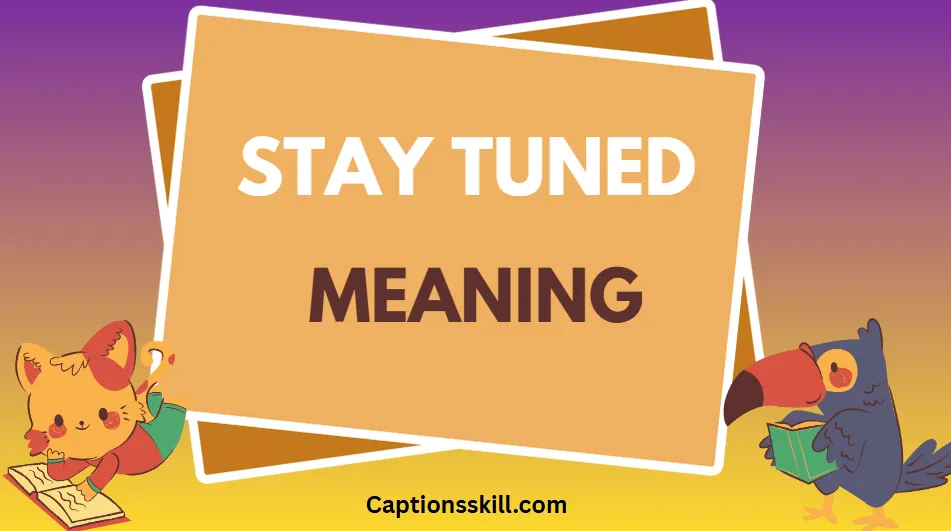Language is constantly evolving, and certain expressions gain a life of their own through popular use in media, conversation, and technology. One such phrase is “stay tuned“ — a short, impactful expression that often appears in TV broadcasts, radio shows, marketing campaigns, and casual conversations. While it might seem simple at first glance, its versatility and tone make it worth exploring in depth.
In everyday life, you might hear someone say, “Stay tuned for more updates!” or “I’ll stay tuned to see what happens.” The phrase carries a sense of anticipation, telling the listener to remain attentive because something more is coming. It can imply suspense, excitement, or the promise of important news.
From a linguistic perspective, “stay tuned” merges literal origins (related to radio and television tuning) with a metaphorical meaning that applies to a variety of scenarios — from business announcements to personal messages. It’s short, catchy, and universally understood in many English-speaking cultures, making it a powerful tool in communication.
This article breaks down the meaning, history, pronunciation, usage, synonyms, related terms, cultural impact, and even the future of the phrase “stay tuned,” while also providing plenty of real-life examples so you can master its use.
What Does “Stay Tuned” Mean?
The phrase “stay tuned” means to remain attentive, keep watching or listening, or to be ready for more information that will come later. It’s essentially an invitation to maintain focus because something important is about to happen or be revealed.
In marketing and broadcasting, “stay tuned” is a call-to-action. For example:
- In a TV show, it might mean “Don’t change the channel; more exciting content is coming.”
- In emails or announcements, it means “We have more details to share soon; keep following us.”
- In personal conversation, it might mean “I’ll update you when I know more.”
The phrase often conveys anticipation and continuity — implying that what comes next will connect to what’s happening now.
Common variations include:
- Please stay tuned…
- I’ll stay tuned for updates.
- Will stay tuned to see what happens.
The Origin and Evolution of “Stay Tuned”
The phrase “stay tuned” originates from radio broadcasting in the early 20th century. Radios had to be physically “tuned” to a specific frequency to receive a signal. When a host said, “Stay tuned,” it meant literally, “Don’t adjust your dial, keep your radio tuned to this station.”
With the rise of television in the 1940s and 1950s, the phrase carried over seamlessly. TV presenters used it to encourage audiences not to switch channels during commercial breaks.
Over time, “stay tuned” took on a figurative meaning that extended far beyond broadcasting:
- In news media, it meant “More information will follow.”
- In corporate announcements, it meant “Updates will be provided soon.”
- In casual conversation, it became a metaphor for staying aware or waiting for developments.
Today, thanks to social media and instant communication, “stay tuned” is often used in tweets, Instagram captions, YouTube videos, and email newsletters, usually to keep audiences engaged.
Is “Stay Tuned” a Slang, Acronym, or Name?
“Stay tuned” is not an acronym — it’s a standard English phrase. It isn’t considered slang in the traditional sense, though it is conversational and informal in tone.
It’s also not a name, but brands and campaigns often use it as a title or tagline. Examples:
- Stay Tuned – a popular NBC News Snapchat show.
- Marketing slogans that include “Stay tuned” to build curiosity.
Linguistically, it’s a verb phrase:
- Stay = remain or continue.
- Tuned = adjusted or prepared (originally referring to tuning radio/TV frequencies).
“Stay Tuned” Pronunciation & Spelling
Pronunciation: /steɪ tjuːnd/ (British) or /steɪ tuːnd/ (American)
Spelling: Always written as two separate words — “stay” and “tuned.”
Phonetic breakdown:
- Stay – rhymes with “day.”
- Tuned – rhymes with “mooned,” though in fast speech, many drop the “d” sound: tune → toon.
Tips for pronunciation:
- In casual American English, “stay tuned” often sounds like stay toon’d.
- In British English, the “u” in “tuned” may sound more like tyooned.
How People Use “Stay Tuned” Today
In the modern era, “stay tuned” appears in multiple contexts:
1. Media and Entertainment
TV anchors, radio hosts, and podcasters use it before ad breaks or at the end of an episode to retain audience attention.
“We’ll be right back after this short break — stay tuned!”
2. Social Media Marketing
Brands use it to tease product launches or announcements.
“Big reveal coming soon… stay tuned!”
3. Emails and Newsletters
It encourages subscribers to keep an eye out for the next update.
“Stay tuned for our next issue featuring exclusive interviews.”
4. Casual Conversation
Friends might say it when updates are pending.
“I don’t have all the details yet, but stay tuned.”
5. Event Promotions
Event organizers build hype by using it in promotional materials.
“Our lineup is dropping next week — stay tuned!”
The key is anticipation — whether in a business, entertainment, or personal setting, it suggests something worth waiting for.
Examples of “Stay Tuned” in a Sentence
Here are 20 sentences showing how it’s used:
- Stay tuned for the results of the competition.
- Please stay tuned for more updates on our new product line.
- I’ll stay tuned to hear what you find out.
- Stay tuned — we’re just getting started.
- The mayor will make an announcement later, so stay tuned.
- Stay tuned as we reveal our grand prize winner.
- Will stay tuned until the final decision is made.
- Stay tuned for breaking news after the commercial break.
- Please stay tuned for the latest weather forecast.
- Stay tuned, because this is about to get interesting.
- I’m staying tuned for any changes in the schedule.
- Stay tuned for our live coverage of the event.
- Keep reading and stay tuned for more exciting tips.
- Stay tuned for our upcoming holiday specials.
- I’ll stay tuned to your email updates.
- Stay tuned for behind-the-scenes footage.
- More details coming soon — stay tuned.
- Stay tuned to find out who wins the championship.
- We’re making some big changes, so stay tuned.
- Please stay tuned, as your feedback is very important to us.
Other Possible Meanings of “Stay Tuned”
While the broadcasting origin is the most common, “stay tuned” can be interpreted in other ways:
- Metaphorical Awareness: Staying mentally alert or aware of changes.
- Business Readiness: Being prepared for new opportunities.
- Personal Life: Remaining patient during a waiting period.
For example:
- “Stay tuned” in a personal growth context could mean staying focused and ready for new life changes.
- In politics, it may mean “Keep following this issue as it develops.”
Words and Acronyms Related to “Stay Tuned”
Some synonyms and related expressions include:
- Keep watching
- Keep listening
- Don’t go anywhere
- Hang tight
- Keep posted
- Await further instructions
- Keep your eyes peeled
- Be on standby
Is “Stay Tuned” in the Dictionary?
Yes. Major dictionaries such as Merriam-Webster and Cambridge list “stay tuned” as an idiomatic expression meaning to remain watching or listening for further information.
The definition often includes both the literal and figurative senses:
- Literal: Don’t change the channel or frequency.
- Figurative: Keep paying attention because more information will follow.
Better Alternatives to Say “Stay Tuned”
If you want to avoid repetition, you can use:
- “Watch this space.”
- “Updates coming soon.”
- “We’ll keep you posted.”
- “Stand by for updates.”
- “More to come.”
Cultural and Generational Impact of “Stay Tuned”
Older generations may associate “stay tuned” with TV and radio broadcasts, while younger generations see it more as a social media teaser phrase.
The meaning is universally understood, but the medium of delivery has evolved dramatically — from radio waves to Instagram stories.
Why It’s Important to Know These Words
Understanding “stay tuned” improves your comprehension of both media language and casual conversation, allowing you to recognize subtle cues for engagement.
It’s also an essential tool for anyone in marketing, journalism, or content creation — because it drives audience retention.
The Future of the Word “Stay Tuned”
The phrase will likely continue to thrive, especially in digital contexts. As attention spans shrink, short and catchy phrases like “stay tuned” will remain valuable for keeping audiences engaged.
However, its delivery will evolve — instead of being said on TV, it might flash on TikTok screens or appear in AI-generated marketing campaigns.
Frequently Asked Questions (FAQs)
Q1: Is “stay tuned” formal or informal?
Mostly informal, but acceptable in professional contexts.
Q2: Can I say “stay tuned” in emails?
Yes, especially in newsletters and announcements.
Q3: Is there a single word for “stay tuned”?
Not exactly, but “anticipate” or “await” can be used depending on context.
Conclusion
The phrase “stay tuned” is a powerful, adaptable expression with roots in broadcasting and a strong presence in modern communication. Whether in media, marketing, or casual chat, it tells people to keep watching, listening, or paying attention because something important is coming next. Its versatility, cultural significance, and simplicity ensure it will remain relevant for years to come.
Also Read: hoochie daddy meaning

Jean Moreau is a talented writer known for crafting engaging captions that resonate with audiences. His creativity enhances social media content effectively.






Leave a Reply